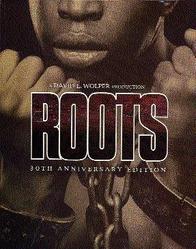
MOVIE: Roots, 30th anniversary edition, Episode 2.
GENRE: Historical drama
RATING: Five stars
RUNNING TIME: 95 minutes
WHO'S IN IT: Edward Asner, LeVar Burton, David Greene, John Erman, William Blinn, Jan Scott, Lynn Stalmaster, Louis Gossett Jr.
WHAT IT'S ABOUT: Episode 2 of the 30th anniversary edition of Roots starts with general rebellion on the Lord Ligonier, put down by cannon fire, and ends with personal rebellion on a Virginia plantation, put down by lashes of the whip. The latter is the famous "what is your name" event, overseer Ames asking the question while the slave James puts the lashes on Kunta Kinte's back. Just when it seems that he will keep repeating 'Kunta Kinte' and be whipped to death he groans 'Toby', the name given to him by plantation owner Reynolds.
It is an agonising scene, Kinte's arms up by his head as he was strung up, one eye totally shut, the other half-closed from the pain, sweat on his brow as he says "my name is Toby". "That's a good nigger. Cut him down," the overseer says. This episode covers Kunta Kinte's landing with the 97 other Africans who survived the Atlantic journey at Annapolis, Maryland, on September 29, 1767, the indignity of the auction block and plantation life. Where the real value lies, though, is in the dialogue, which continues to be superb (after all, the novel Roots from which the mini-series was made was a standout), as well as the attitude of the American-born slave ('Fiddler'), as played by Louis Gossett Jr. . So just before the uprising on theship, when the Captain tells a wary first mate that "surely armed men in good health can restrain chained men in weakened condition", it is a statement that has wider implications for plantation life in general. A planter buys an African woman and tells the fast-talking auctioneer "My pleasure, sir. And I anticipate she will be my pleasure," this being the tip of the everyday rape of African women by whites that was a part of slavery. Fiddler, who picked out Kunta Kinte for Reynolds to buy for 155 pounds, tells him, "You belong to Maasa Reynolds now and that's all there is to it. You in America now." And he explains his favoured status with "I eats in the big house kitchen. I got pine boards on the floor of my cabin ... Now that is fine living for a nigger ..." The first encounter between the freshly arrived African and those already on the plantation is one filled with mistrust and even animosity, silent as it is as Kunta looks at them from the back of the wagon he arrived in. The six months that Fiddler is given to whip Kunta Kinte into a "proper field hand who dies speaks the King's English and does exactly as he is told" is cut short by a runaway attempt to see Fanta, who was on the same slave ship. Running in leg irons is simply not a good idea.
Then comes the recapture, via dogs. Then comes the whipping. Then comes the 'Toby'. Then comes the surprise, as the cooperative Fiddler, who cradles Kunta's head and gives him water, says "What you care what the white man call you ... You know who you be. Kunta. That's who you always be. Kunta Kinte. There be another day, you hear me. There go be another day."
LONG STORY SHORT: An African is rebellious from the ship through to the auction block (he gets away briefly) and on the plantation, by action and lack of word meets the lash of the well-oiled whip, applied by a slave named James at the white overseer's instruction while the other slaves watch.
THE REEL LOW-DOWN: If you watched the tapes of the police in action in apartheid South Africa the end of this one will be familiar.
Next week: Episode 3.

